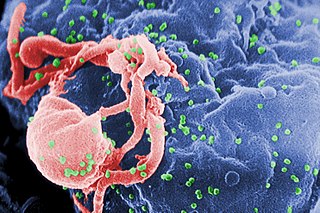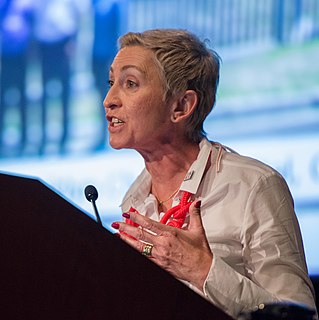Related Research Articles

HIV/AIDS denialism is the belief that human immunodeficiency virus (HIV) does not cause acquired immune deficiency syndrome (AIDS), despite conclusive evidence to the contrary. Some of its proponents reject the existence of HIV, while others accept that HIV exists but argue that it is a harmless passenger virus and not the cause of AIDS. Insofar as they acknowledge AIDS as a real disease, they attribute it to some combination of sexual behavior, recreational drugs, malnutrition, poor sanitation, haemophilia, or the effects of the medications used to treat HIV infection (antiretrovirals).

HIV/AIDS originated in Africa in the early 20th century and is a major public health concern and cause of death in many African countries. AIDS rates vary dramatically although the majority of cases are concentrated in Southern Africa. Although the continent is home to about 15.2 percent of the world's population, more than two-thirds of the total infected worldwide – some 35 million people – were Africans, of whom 15 million have already died. Sub-Saharan Africa alone accounted for an estimated 69 percent of all people living with HIV and 70 percent of all AIDS deaths in 2011. In the countries of sub-Saharan Africa most affected, AIDS has raised death rates and lowered life expectancy among adults between the ages of 20 and 49 by about twenty years. Furthermore, the life expectancy in many parts of Africa is declining, largely as a result of the HIV/AIDS epidemic with life-expectancy in some countries reaching as low as thirty-nine years.

Mantombazana "Manto" Edmie Tshabalala-Msimang was a South African politician. She was Deputy Minister of Justice from 1996 to 1999 and served as Minister of Health from 1999 to 2008 under President Thabo Mbeki. She also served as Minister in the Presidency under President Kgalema Motlanthe from September 2008 to May 2009.
This is a timeline of AIDS, including AIDS cases before 1980.

AIDS is caused by a human immunodeficiency virus (HIV), which originated in non-human primates in Central and West Africa. While various sub-groups of the virus acquired human infectivity at different times, the global pandemic had its origins in the emergence of one specific strain – HIV-1 subgroup M – in Léopoldville in the Belgian Congo in the 1920s.
Christine Joy Maggiore was an HIV-positive activist and promoter of HIV/AIDS denialism. She was the founder of Alive & Well AIDS Alternatives, an organization which disputes the link between HIV and AIDS and urges HIV-positive pregnant women to avoid anti-HIV medication. Maggiore authored and self-published the book What If Everything You Thought You Knew about AIDS Was Wrong?

Human immunodeficiency virus infection and acquired immunodeficiency syndrome (HIV/AIDS) is a spectrum of conditions caused by infection with the human immunodeficiency virus (HIV), a retrovirus. Following initial infection an individual may not notice any symptoms, or may experience a brief period of influenza-like illness. Typically, this is followed by a prolonged incubation period with no symptoms. If the infection progresses, it interferes more with the immune system, increasing the risk of developing common infections such as tuberculosis, as well as other opportunistic infections, and tumors which are otherwise rare in people who have normal immune function. These late symptoms of infection are referred to as acquired immunodeficiency syndrome (AIDS). This stage is often also associated with unintended weight loss.
Nozipho Bhengu was a South African woman whose death from an AIDS-related illness intensified the controversy about how AIDS is treated in South Africa. Nozipho was well known in South Africa for her openness about her illness as well as her refusal to take conventional medical treatment for AIDS in favour of alternative and controversial natural treatment.

HIV/AIDS is one of the most serious health concerns in South Africa. The country has the highest number of people afflicted with HIV of any country, and the fourth-highest adult HIV prevalence rate, according to the 2019 United Nations statistics.
Eliza Jane Scovill was the daughter of AIDS denialist Christine Maggiore, an HIV-positive activist who publicly questioned the link between HIV and AIDS, and supported HIV-positive pregnant women who want to avoid taking anti-HIV medication. Eliza Jane's May 16, 2005 death from AIDS at the age of three and a half, sparked a social and legal controversy over her mother's decision not to take precautions during pregnancy and breastfeeding to prevent transmission of the virus, and her parents' decision to not have her treated for HIV infection during her life.
Charlene Leonora Smith is a South African journalist, published author of 14 books, and is an authorized biographer of Nobel Peace Prize winner, and former South African President, Nelson Mandela. She is also a communications and marketing consultant who lives and works in the United States.
The portrayal of HIV and AIDS in the media refers to events and trends in the discussion of HIV and AIDS in mass media. HIV leads to a large amount of illness and many deaths. It is unique from most other diseases because there is stigma and discrimination surrounding those affected with the disease. The transmission of HIV, however, is extremely preventable and the media is a very effective way to convey this information. The UNESCO report on Journalism Education says, "Well researched television content can create public awareness about HIV prevention, treatment, care and support can potentially influence the development and implementation of relevant policies."
Gisèle Wulfsohn was a South African photographer. Wulfsohn was a newspaper, magazine, and freelance photographer specialising on portrait, education, health and gender issues. She was known for documenting various HIV/AIDS awareness campaigns. She died in 2011 from lung cancer.
In South Africa, HIV/AIDS denialism had a significant impact on public health policy from 1999 to 2008, during the presidency of Thabo Mbeki. Mbeki criticized the scientific consensus that HIV does cause AIDS beginning shortly after his election to the presidency. In 2000, he organized a Presidential Advisory Panel regarding HIV/AIDS including several scientists who denied that HIV caused AIDS.

Glenda Elisabeth GrayMB BCh, FC Paeds, DSc (hc), is a South African physician, scientist and activist specializing in the care of children and in HIV medicine. In 2012, she was awarded South Africa's highest honour, the Order of Mapungubwe (Silver). She became the first female president of the South African Medical Research Council in 2014, was recognized as one of the "100 Most Influential People" by TIME in 2017 and was listed amongst "Africa's 50 Most Powerful Women" by Forbes Africa in 2020. Her research expertise involves developing microbicides for sexually transmitted diseases and HIV vaccines.
Lucy Finch is a palliative nurse who has worked in several African countries and founded a hospice in Malawi – Ndi Moyo – "the place giving life".
Sibongile Ndashe is a South African lawyer and human rights activist. She has been involved in public interest law since 1999 and has worked for several women's rights and human rights organisations. She founded the Initiative for Strategic Litigation in Africa (ISLA) in 2014 and has worked to help lawyers across Africa bring cases to court involving gender identity and sexual orientation. She supports the incremental decriminalisation of homosexuality. In October 2017 she was arrested in Tanzania on charges of "promoting homosexuality" whilst discussing ways to challenge a ban on HIV/AIDS treatment by private health clinics.

Linda-Gail Bekker MBChB, DTMH, DCH, FCP(SA) is a Professor of Medicine and Chief Operating Officer of the Desmond Tutu HIV Foundation. She is also Director of the Desmund Tutu HIV Centre at the University of Cape Town. She is a Past President of the International AIDS Society (2016-18).
Gita Ramjee was a Ugandan-South African scientist and researcher in HIV prevention. In 2018, she was awarded the ‘Outstanding Female Scientist’ award from the European and Developing Countries Clinical Trials Partnership. She died in Umhlanga, Durban, South Africa, from COVID-19 related complications.
Nozipho may refer to:
References
- ↑ "No drugs, just take vitamins: the dangerous advice to cure HIV". The Guardan. 15 September 2008. Retrieved 1 November 2016.
- ↑ "Nozipho Bhengu". The Economist. 8 June 2006. Retrieved 4 March 2019.
Nozipho Bhengu, victim of AIDS and quackery, died on May 19th, aged 32